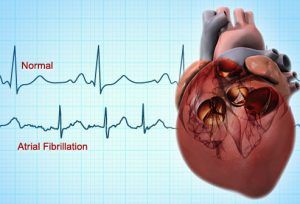Coronary heart disease (CHD) is a heart condition which usually results from plaque build-up inside the coronary arteries, which carry oxygen rich blood to the heart. A plaque formation, which is the deposition of cholesterol, narrows these blood vessels and reduces supply of oxygen and blood to the heart. CHD symptoms include shortness of breath and chest pain (angina), while heart attack is its serious manifestation.
Genes have a vital biological role in heart function, blood vessel health (endothelial function), cholesterol & triglyceride metabolism, inflammatory signaling and blood coagulation. There are certain variations in these genes, which have found to be associated with a high risk for Coronary Heart Disease.
Atrial Fibrillation

Atrial fibrillation (AF) is the most common type of arrhythmia. An arrhythmia is an abnormality in the heart beat or heart rhythm. During arrhythmia, the heart beat can be either too fast or too slow, or there can be an irregularity in heart rhythm. AF occurs if rapid, disorganized electrical signals cause the heart’s two upper chambers (atria) to fibrillate (contract very fast and irregularly).
Although ,atrial fibrillation itself usually isn’t life-threatening, it is a serious medical condition that sometimes requires emergency treatment as it can lead to other serious complications. Atrial fibrillation may lead to blood clot formation in the heart that may circulate to other organs and lead to blockage of blood flow.
Variations in important genes which have a role in the generation of electrical impulses in the heart muscle, affect the expression of these genes thereby increasing the risk for a disturbance in the contraction of atria leading to their dilation and fibrillation i.e., conferring a genetic predisposition towards AF.




